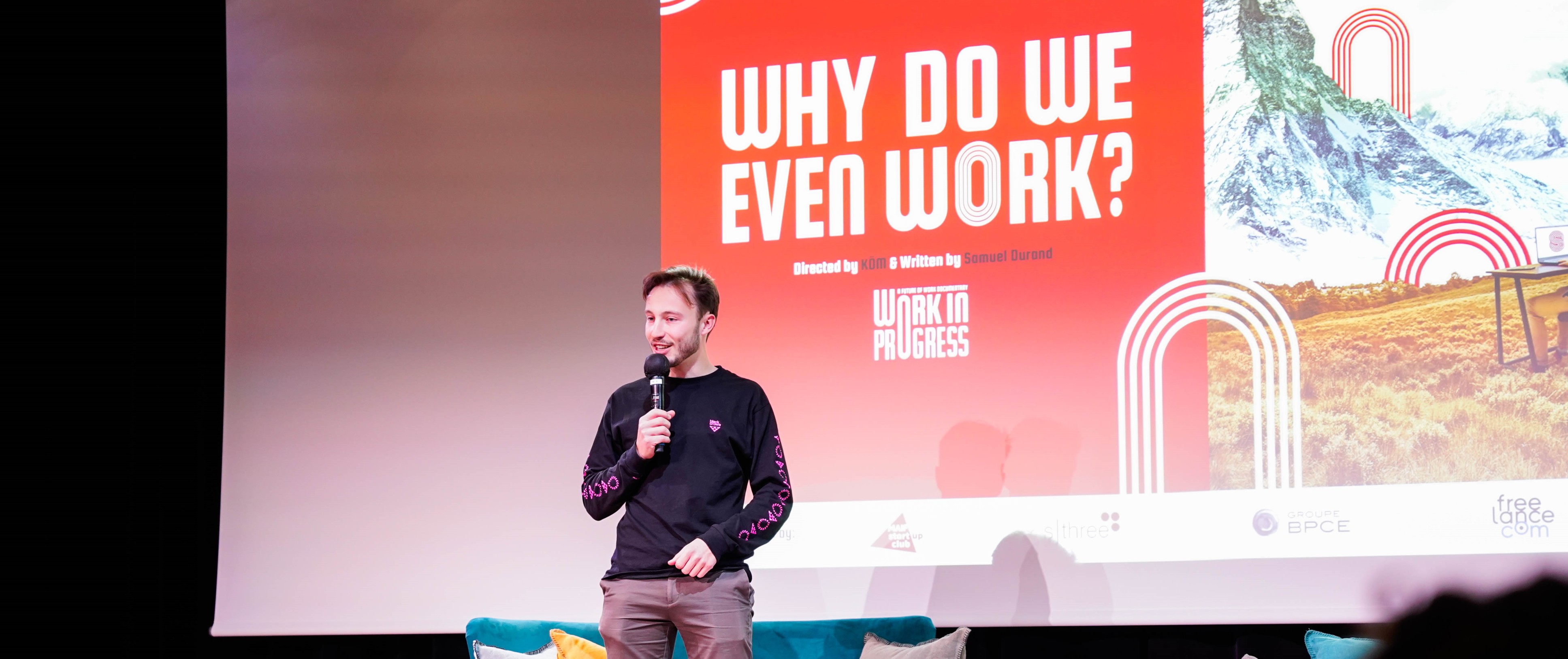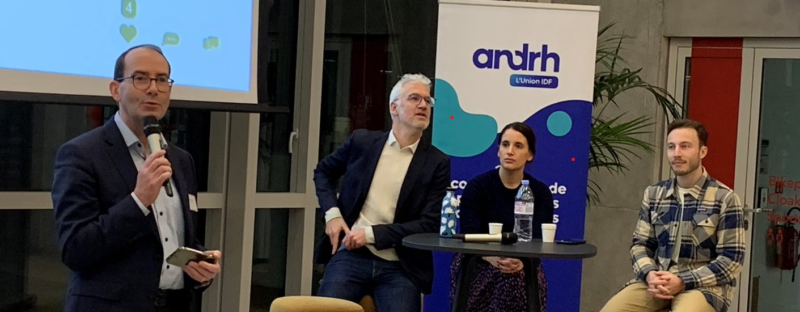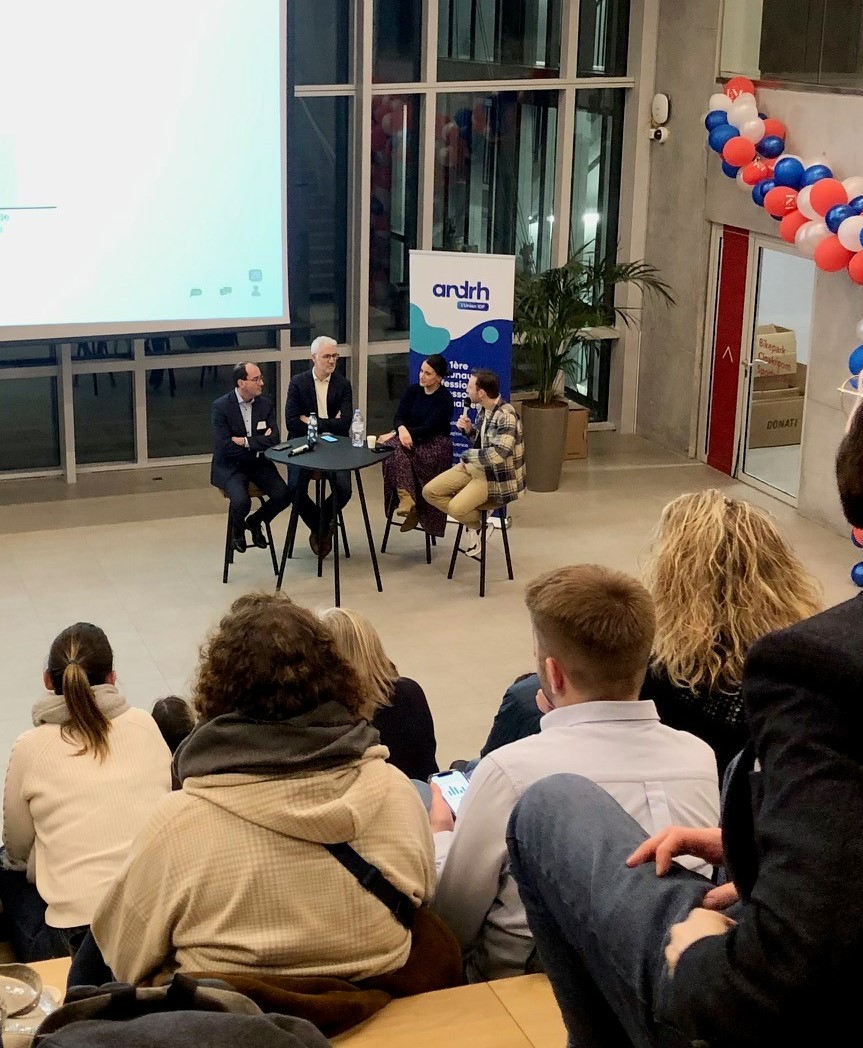Why do we even work ?
Back to our film-debate with ANDRH IDF
Back to our film-debate with ANDRH IDF
Recently, we organized with our partner ANDRH a movie-debate around the latest documentary "Why do we even work" by Samuel Durand. With on stage :
- Doriane Bettinger, Director of People & Transformation at Parella,
- Vincent Meyer of the "Human Resource Management and Organization" Department of EM Normandie and
- Jean-Christophe Brochet HRD Health, Safety, Real Estate FR of Engie BtoC and President of ANDRH IDF.
While the relationship at work is at the center of the debates with the announcement of the pension reform, let's come back together on the 3 main pillars of motivation at work explored by Samuel Durand and the comments of our speakers: Why do we work and why do we join one organization rather than another?
Here are the learnings from this very rich debate.
Enjoy your reading!
The work environment and the quest to be oneself
It is the first reason for motivation at work and why people like to get up in the morning to come to work. On the one hand, it is the place, the physical or virtual space, which in its typologies and tools allows us to interact with others. And these others will bring us learning, recognition, a feeling of belonging to a group and more and more friendship or even adoptive family ties.

Samuel Durand is presenting the event "Why do Even Work".
Because the expectation is indeed that of the individual, to be oneself, to be able to create real relationships at work, to be able to have fun, in the sense of being animated by pleasure and enthusiasm, to have rituals and strong collective moments. Of course, at a certain level, political games will take precedence, as the company remains focused on the performance and emulation of its employees.
But it is important to create the conditions and provide an environment to feel good with others. The same is true for the notion of benevolence, which has become essential today at the managerial level. It is important for the company to be true to its intentions, to its way of doing things. This is what contributes to social cohesion.
The development of autonomy
and new forms of management
and new forms of management
The second motivation at work is autonomy. Today, we observe a Taylorization of the tertiary professions with a segmentation of roles and the creation of repetitive tasks, which is why the question of autonomy must be restated today.
Telework has been a gas pedal. We have moved from the age of control to the age of commitment and the creation of the collective. But we cannot declare ourselves autonomous and we must create the conditions for this autonomy. This must be materialized in the work environment and in the decision-making processes. We talk about supervised autonomy: it is not a matter of creating a vacuum where everything is possible without anything being done, but of allowing employees to achieve their goals by supporting them.

Hence the new role of the manager: companion, facilitator, coach, etc.
After the notion of "care", it is the notion of creativity that is developing: creativity is finding solutions to a problem. Creativity is not limited to the so-called creative professions, but is open to all! It is up to the manager to stimulate and encourage it and to ensure that employees do not limit themselves.
A new evolution of the manager's role... Could there be organizations without managers in the future? This is the case of Mindera, mentioned in the documentary. But this remains difficult to conceive in most of our companies.
In the meantime, this autonomy is accompanied by both the tools made available (and the work environment can and must be facilitative), and by management.
The company's mission and its necessary coherence
Corporate culture goes beyond a slogan and a logo, it must be embodied. It is no longer a matter of usurping the codes of other companies that have succeeded in embodying their values, but of creating consistency. (No, it is not enough to propose a table soccer!)
Doriane Bettinger shared the example of a company with a mission that recently redeveloped its headquarters. Meeting the company's commitments posed many challenges to the project:
- Guarantee the low environmental impact of materials by controlling their origin and composition, or
- To ensure the decoration with objects hunted on the territories of origin of the brand in a circular economy.
The employees who have lived this project tell this story with pride and become the first ambassadors of these values lived in practice.

Mission and values cannot be decreed, they are built. They can even be affirmed and reinforced in response to an external or internal scandal. This is what Ben&Jerry's illustrates in the documentary, with the position they took in the Black Lives Matter movement. And this singular construction is the foundation of the company's authenticity.
The PACTE law thus offers companies the opportunity to go beyond their service/economic responsibilities, to become part of an ecosystem and to undertake a profound cultural transformation.
The objective is to ensure that these values and this raison d'être are embodied in everyday life, and to help employees connect with them. The expectations of the new generations are very high, as shown by the speeches made by AgroParisTech students at their graduation ceremony and those of other schools afterwards.
What Future Of Work?
We realize that a set of good practices in favor of well-being and performance already exist in companies, but only for a minority of people. This was for example the case of telecommuting, which was reserved to some tech companies before the crisis and which has now been democratized. The "Future of work" is therefore to make these practices accessible to the greatest number of people to transform it into a "Present of work".
If the world of work has changed little in recent years, the field of possibilities is opening up today. Technological developments and employee expectations are becoming clearer in terms of approaches to work. New forms of organization are beginning to emerge. In this society of transition, we have the power to make things happen. It's up to us to contribute.
In the meantime, we are at your disposal to discuss with you these new ways of working and the solutions to create an environment conducive to fulfillment and motivation at work.
Follow us on Linkedin to get future articles on new ways of working.






